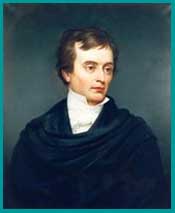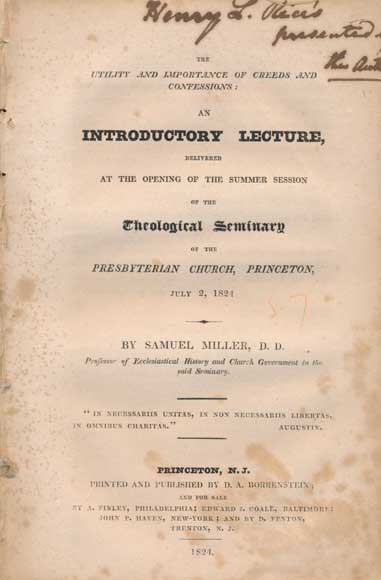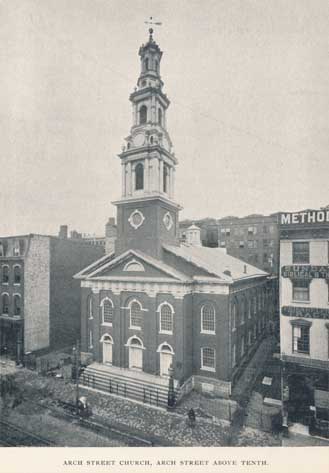A Long and Faithful Ministry
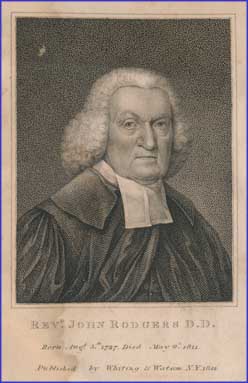 John Rodgers was born in Boston on the 5th of August, 1727. He was the son of Thomas and Elizabeth Rodgers, who had emigrated from Londonderry, Ireland just six years prior. When John was little more than a year old, he and his parents relocated to Philadelphia.
John Rodgers was born in Boston on the 5th of August, 1727. He was the son of Thomas and Elizabeth Rodgers, who had emigrated from Londonderry, Ireland just six years prior. When John was little more than a year old, he and his parents relocated to Philadelphia.
While still a child, he gave evidence of a deep love of knowledge and even a care and thoughtfulness about his eternal soul. It was under the preaching of Whitefield that he was first solidly impressed with the truths and duties of the Christian faith. On one occasion, when Whitefield was preaching in the evening, near the Court House on Market Street, young John was standing near him, holding a lantern to assist Whitefield. But Rodgers became so impressed with the truth to which he was listening that, for a moment, he forgot himself and dropped the lantern, breaking it in pieces. Years later, when Rodgers was settled in his first pastorate, Dr. Whitefield came to visit his house, and Rev. Rodgers related the incident to him, asking if he remembered it. “Oh yes,” replied Whitefield, “I remember it well; and have often thought I would give almost any thing in my power to know who that little boy was, and what had become of him.” Rev. Rodgers replied with a smile,—”I am that little boy.” Whitefield burst into tears, and remarked that he was the fourteenth person then in the ministry, whom he had discovered in the course of that visit to America, of whose hopeful conversion he had been the instrument.
When William Buell Sprague asked the Rev. Dr. Samuel Miller for his recollections of Rev. Rodgers, this was Miller’s reply:
Rev. dear Brother: When you request me to prepare for your forthcoming biographical work some brief memorials of the late venerable Dr. Rodgers of New York, I feel as if I were called not to the performance of a task, but to the enjoyment of a privilege. If there be a man living who is entitled to speak of that eminent servant of Christ, I am that man. Having been long and intimately acquainted with him; having served with him twenty years as a son in the Gospel ministry; and having enjoyed peculiar opportunities of contemplating every phase of his character, personal and official; so my ardent attachment and deep veneration of his memory make it delightful to record what I knew with so much distinctness, and remember with so much interest.
“My acquaintance with Dr. Rodgers began in 1792, when he was more than sixty years of age, and when I was a youthful and inexperienced candidate for the ministry. He recognized in me the son of an old clerical friend, and from that hour till the day of his death treated me with a fidelity and kindness truly paternal. And when, next year, I became his colleague, he uniformly continued to exercise toward me that parental indulgence and guardianship which became his inherited friendship, as well as his Christian and ecclesiastical character.
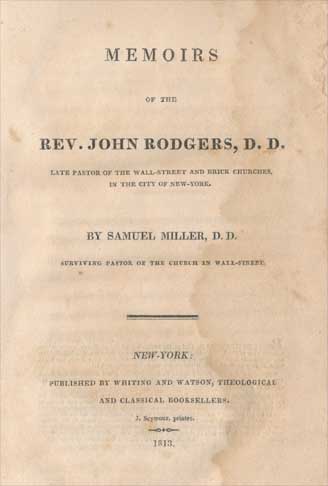 “Without attempting in this connection to enter into the details of his history, which I have already done at large in my “Memoir” of this beloved man, I shall content myself with recounting in a brief manner those features of his character which I regard as worthy of special commemoration, and which rendered him so conspicuous among the pastors of his day.
“Without attempting in this connection to enter into the details of his history, which I have already done at large in my “Memoir” of this beloved man, I shall content myself with recounting in a brief manner those features of his character which I regard as worthy of special commemoration, and which rendered him so conspicuous among the pastors of his day.
“One of the great charms of Dr. Rodgers’ character was the fervour and uniformity of his piety. It not only appears conspicuous in the pulpit,–dictating his choice of subjects, his mode of treating them, and his affectionate earnestness of manner; but it attended him wherever he went, and manifested itself in whatever he did. In the house of mourning it shone with distinguished lustre. Nor was this all. He probably never was known to enter a human dwelling for the purpose of paying an ordinary visit, without saying something before he left it to recommend the Saviour and his service. Seldom did he sit down at the convivial table, without dropping at least a few sentences adapted to promote the spiritual benefit of those around him…
“Another quality in Dr. Rodgers which, next to his piety, contributed to his high reputation, was prudence, or practical wisdom. Few men were more wary than he in foreseeing circumstances likely to produce embarrassment or difficulty, and in avoiding them…
“He was remarkable also for the uniform, persevering and indefatigable character of his ministerial labours. In preaching, in catechising, in attending on the sick and dying, in all the arduous labours of discipline and government, and in visiting from house to house, he went on with unceasing constancy, year after year, from the beginning to the end of his ministry…
“The character of Dr. Rodgers’ preaching was another of the leading elements of his popularity and usefulness. The two qualities most remarkable in his preaching were piety and animation. His sermons were always rich in evangelical truth; and they were generally delivered with solemnity and earnestness which indicated a deep impression on his own heart of the importance of what he uttered…
“Dr. Rodgers was eminently a disinterested man. Few men have ever been more free from private and selfish aims in acting their part in the affairs of the Church, than he…
Dr. Rodgers was further distinguished by a punctual attendance on the judicatories of the Church. He made it a point never to be absent from the meetings of his brethren, unless sickness or some other equally imperious dispensation of Providence rendered his attendance impossible. And when present in the several ecclesiastical courts, he gave his serious and undivided attention to the business which came before them, and was always ready to take his full share, and more than his share, of the labour connected with that business…”
Dr. Samuel Miller continued a bit further with his recollections, but we will leave him there. If you would like to read Miller’s Memoir of Dr. Rodgers, it can be conveniently found on the Web, here. Dr. Rodgers lived a long life, and was blessed to minister to the Lord’s people for some sixty three years. He died on May 7th, 1811.
Words to Live By:
Why should a pastor trouble himself to participate in the courts of the Church? It turns out that question is at least 175 years old, if not more. In 1836, one pastor put the question, seeing that it cost him about $50.00 to attend the meetings of Synod, and took three weeks away from his congregation. Keep in mind that $50 would have been at least two week’s wages for a pastor in 1836, perhaps more.] In reply, the editor of the Presbyterian newspaper offered six reasons as to why teaching and ruling elders should faithfully attend the courts of the Church:
1. Should every member of Synod conclude from similar premises that it was not his duty to attend, there would be no meeting at the time and place appointed, and of course no business done.
2. One member frequently changes the entire complexion of a meeting; and no one has a right to suppose that his presence is a matter of indifference.
3. If the member can afford the expense it will be money well laid out, and if not, his people should aid him. The time occupied in going and returning, may often be profitably employed. The journey may be of advantage to his health. In conference with his brethren he may receive a new impulse in his Christian course, and be better prepared to labor with effect among his people on his return; so that neither he nor they will be losers by his absence.
4. When he was set apart to the work of the Ministry, he was expected to make many sacrifices for the good of the cause. And if his brethren to whom he has solemnly promised subjection in the Lord, did not regard attendance upon the Judicatories of the Church as important, they would not have exacted an apology or excuse for non-attendance.
5. Instances are exceedingly rare that a Minister has ever cause to regret the sacrifices which he has made in attending the Judicatories of the Church. On the contrary he most usually feels himself amply repaid for all the sacrifices which it has cost him.
6. The present crisis of the Church seems to demand more than ever a full attendance both of Ministers and Elders, cost what it may. [That statement, made in 1836, had the Old School/New School debate in view. But apart from that context, sadly, the statement seems to stand as a constant truth.]
[excerpted from The Charleston Observer, vol. 10, no. 39 (24 September 1836); 154, column 4.]

